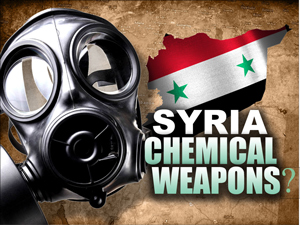Syria weapons deal lessens tension, but a major crisis remains
By Askia Muhammad -Senior Editor- | Last updated: Sep 17, 2013 - 6:10:02 PMWhat's your opinion on this article?

|
A suspicious, horrific chemical weapons attack in a Damascus suburb on Aug. 21 forced Mr. Obama’s hand because one year ago the president warned that the use of such weapons by Syrian President Bashar al-Assad’s forces amounted to crossing a “red line” which would lead to a forceful U.S. military response.
Without offering a shred of proof that the attack was waged by Syrian government forces, the U.S. president groped along for nearly 2 weeks, threatening missile attacks even as world public opinion, U.S. public opinion, and even support from an ordinarily trigger-happy Congress evaporated, until Secretary of State John Kerry suggested that military force might be avoided if the Syrian government would turn over its stockpile of chemical weapons to international control.
Russian President Vladimir Putin seized on the idea, President Assad quickly agreed, and negotiations between the U.S. and the Russian Federation sped ahead until an announcement came with Secretary Kerry and Russian Foreign Minister Sergey Lavrov standing side by side in Geneva, Switzerland, after three days of negotiations. They set out a series of steps the Syrian government must follow to avoid the U.S. attack.
Syria must submit a comprehensive list of its chemical weapons stockpile within one week, Mr. Kerry said, and international inspectors must be on the ground no later than November and the weapons must be relinquished by mid-2014.
President Obama said in a statement Sept. 14 that the framework “represents an important concrete step toward the goal of moving Syria’s chemical weapons under international control so that they may ultimately be destroyed. There are consequences should the Assad regime not comply with the framework agreed today. And, if diplomacy fails, the United States remains prepared to act.”
While the U.S. and Syria have maintained somewhat strained diplomatic relations, since the 1990 Gulf War, all along, the Syrians have made gestures of cooperation with the U.S. In 1990–91 when this country attacked Iraq for its invasion of Kuwait, Syria cooperated with the United States as a member of the multinational coalition of forces.
In 1991, then Syrian President Hafez al-Assad—father of the current Syrian leader—made a historic decision to accept then President George H.W. Bush’s invitation to attend a Middle East peace conference and to engage in subsequent bilateral negotiations with Israel. Then, in the aftermath of the September 11 attacks in the United States in 2001, the Syrian government began limited cooperation with U.S. in this country’s so-called “War on Terror.”
But at the very moment the Syrians were cooperating in good faith with this country in 2001, neo-conservative, pro-Israeli war-hawks inside the Pentagon had marked the country for de-stabilization and overthrow.

In 2007, General Wesley Clark, the retired four-star general who was the Supreme Allied Commander of NATO forces during the Kosovo War described in an interview with Amy Goodman how an unnamed Pentagon official, just after the September 11th attacks, talked about a memo that said the U.S. planned to take out 7 countries in 5 years, including Syria. |
“About 10 days after 9/11, I went through the Pentagon, and I saw Secretary Rumsfeld and Deputy Secretary Wolfowitz,” Gen. Clark said in the interview, describing his visit with another, unnamed officer working for the Joint Chiefs of Staff. “So I came back to see him a few weeks later, and by that time we were bombing in Afghanistan.
“I said, ‘Are we still going to war with Iraq?’ And he said, ‘Oh, it’s worse than that.’ He said—he reached over on his desk. He picked up a piece of paper, and he said, ‘I just got this down from upstairs,’ meaning the secretary of defense’s office, ‘today.’ And he said, ‘This is a memo that describes how we’re going to take out 7 countries in 5 years, starting with Iraq, and then Syria, Lebanon, Libya, Somalia, Sudan and, finishing off, Iran.’”
Some of those same countries were Israel’s sworn enemies, making up what was once called the “Steadfastness and Confrontation Front.” The Front was formed in 1977 by the governments of Libya, Algeria, Syria and South Yemen, as well as by the Palestine Liberation Organization (PLO) as a protest, after Egyptian President Anwar Sadat traveled to Tel-Aviv to meet Israeli Prime Minister Menachem Begin, beginning peace negotiations with the Zionist state.
Syria, now a staunch ally of Iran, is next-to-the-last of the 7 targeted countries to remain standing, and Israelis have welcomed the two-year-old Syrian civil war because it has weakened the Assad government. Major population centers from Homs to Aleppo are now simply piles of rubble; the fighting has degraded the government’s military capacity; and it’s left Syria’s Lebanese ally, Hezbollah also weakened, having suffered thousands of casualties in its counterinsurgency campaign inside Syria.
“We used to call the Iran-Iraq War the blessed war,” reflected Caroline Glick, a right-wing Israeli commentator and former aide to Prime Minister Benjamin Netanyahu. “May it go on for a hundred years,” she said, according to a commentary posted by Max Blumenthal on Al-Jazeera.
“For Israel,” Mr. Blumenthal wrote, “the (Syrian civil war) situation represents the fulfillment of a strategy outlined by the neoconservative scholar Bernard Lewis, a favorite of (Prime Minister) Netanyahu and many of his advisers. ‘[A] possibility, which could even be precipitated by [Islamic] fundamentalism, is what has of late been fashionable to call ‘Lebanonization,’ ” Lewis wrote in an influential 1992 essay in Foreign Affairs called “Rethinking the Middle East.”
“If the central power is sufficiently weakened, there is no real civil society to hold the polity together, no real sense of common identity … The state then disintegrates—as happened in Lebanon—into a chaos of squabbling, feuding, fighting sects, tribes, regions, and parties.”
Syria remains a proxy target for Israel’s main enemy in the region—Iran. “The decline of US influence in the Middle East is worrying,” The Jerusalem Post complained in an editorial Sept. 15 analyzing the chemical weapons peace deal. “The U.S. is, after all, Israel’s biggest and strongest ally and the Jewish state is heavily dependent on America, particularly regarding Iran’s nuclear weapons program.
“The threat to U.S. interests posed by Iran’s obtaining nuclear weapon capability is incomparably more pressing than the situation in Syria, where America has no clear interest in military intervention, aside from Barack Obama’s obligation to stand behind his promises,” the editorial continues. “Few conclusions can be drawn from American inaction on Syria. Still, America’s hesitancy inevitably emboldens the Iran-Syria-Hezbollah axis.
“And rightly or wrongly, Israeli leaders–including Prime Minister Binyamin Netanyahu–seem to interpret America’s vacillating on Syria as proof that Israel will be forced into the unpleasant option of acting alone against Iran. If Obama is unable or unwilling to enforce the red lines he imposed with regard to Syria’s use of chemical weapons, argue senior officials in Jerusalem, it is difficult to envision the U.S. taking on the even more daunting task of a military confrontation with Iran,” The Jerusalem Post said.
Now, the chemical weapons deal, and the prospect that negotiations might lead to a larger peace deal which could allow President Assad to remain in power is troubling to U.S. neoconservatives and to many elected officials.
Meanwhile, a UN report issued Sept. 16, has confirmed that the chemical agent sarin was used in a rocket attack in the Syrian capital, Damascus, although it has not attributed blame. “This is a war crime,” Secretary-General Ban Ki-moon said.
The U.S. alleged without proof, that the government was responsible. World powers will now try to hammer out a UN Security Council resolution enforcing the deal. Earlier, UN investigators said they were probing 14 alleged chemical attacks in Syria since September 2011. Many of those attacks, the government insisted, were carried out against its forces by rebel forces.
INSIDE STORIES AND REVIEWS
-
-
About Harriett ... and the Negro Hollywood Road Show
By Rabiah Muhammad, Guest Columnist » Full Story -
Skepticism greets Jay-Z, NFL talk of inspiring change
By Bryan 18X Crawford and Richard B. Muhammad The Final Call Newspaper @TheFinalCall » Full Story -
The painful problem of Black girls and suicide
By Charlene Muhammad -National Correspondent- » Full Story -
Exploitation of Innocence - Report: Perceptions, policies hurting Black girls
By Charlene Muhammad -National Correspondent- » Full Story -
Big Ballin: Big ideas fuel a father’s Big Baller Brand and brash business sense
By Bryan Crawford -Contributing Writer- » Full Story






 Click Here Stay Connected!
Click Here Stay Connected!








